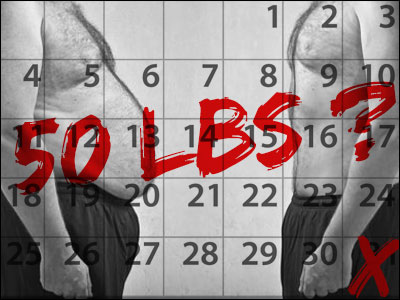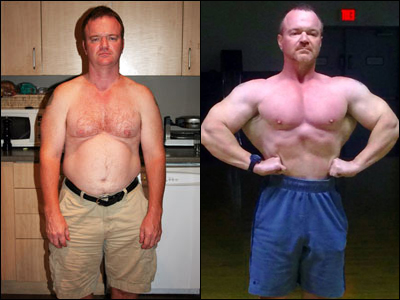Question: How can I lose fifty pounds in one month?
Answer: Assuming you mean fifty pounds of fat, you can’t.*
Contrary to the hyperbolic claims of weight-loss supplement advertisements, tabloid magazines, and sketchy health web sites there is no diet or exercise program you can follow, no supplement you can take, and no “weird trick” or “secret” you can do to lose fifty pounds in only one month.
Assuming you want to look and feel better what you really want to lose is fat not just indiscriminate weight, and even at its fastest losing fat is a slow process. One pound of fat contains about 3,500 calories worth of energy, and most people’s bodies only burn about 2,000 to 2,500 calories per day. The approximately 175,000 calories stored in fifty pounds of fat more than enough energy to sustain you for over two months even if you ate nothing and performed a few hours of intense physical activity every day.

You can not lose fifty pounds of fat in only one month.
Even if it were possible to do this for more than a few days without becoming exhausted and malnourished most of the weight you lose in the first few weeks would come from water and lean body mass instead of fat. And no, you can not and should not even try to lose that much weight from water. Someone with average body composition will start to suffer physically and mentally after losing only around ten percent of their body weight due to dehydration and will die after losing between fifteen and twenty percent. This percentage goes down as body fat goes up, since body fat only contains around ten percent water while most other body tissues contain between seventy and eighty percent.
The reason you will lose lean body mass along with the fat if you do this is your body can only get around thirty calories of energy from each pound of fat per day**. If your energy deficit exceeds the amount of energy your body can take from your fat stores it will get the extra energy elsewhere, mainly from your muscle glycogen stores, muscles, and other organs. This might cause you to lose weight faster initially but reducing your lean body mass will negatively affect your underlying body shape and decrease your metabolic rate. Instead of getting leaner you’ll just become “skinny-fat” and a lower metabolic rate means slower fat loss and a harder time keeping fat off after you lose it.
Even if you have a lot of body fat there are practical limits to how much of a calorie deficit you can create. Most physical activities do not burn as many calories as people would like to believe*** and the calories burned from those activities do not increase proportionally with the time spent doing them, so increasing your daily calorie expenditure is not an effective, efficient, or practical way for most people to increase their calorie deficit.
There is also a limit to how much you can decrease your daily calorie intake without taking in too little food to provide enough protein and other nutrients to maintain lean body mass and avoid nutrient deficiencies. Unless you’re very fat you shouldn’t try to lose more than two pounds of fat per week on average, and the leaner you get the less you should try to lose if you want to avoid losing muscle along with the fat.
Your real goal is to improve your physical appearance, fitness, and health and not just reduce a number on a scale. That means improving your body composition – your ratio of muscle to fat – and not just losing weight. As slow as fat is to lose, muscle is even slower to gain so you do not want to lose any if you can avoid it. It is easier to maintain or even increase your muscle mass if you try to lose fat more slowly, and this will give you a better body in the long run than if you sacrifice muscle for faster short-term fat loss.

The more muscle you keep the better you look after losing fat.
With this in mind a more realistic time frame to lose fifty pounds of fat is anywhere from around four months (if you’ve got a lot more than fifty pounds to lose) to one year (if you’ve only got about fifty pounds to lose).
With that out of the way, here is what you need to do to lose those fifty pounds in a more realistic time frame:
Measure everything you eat and drink every day and record the calories and protein. Gradually reduce your daily calorie intake until you are steadily losing an average of one to two pounds per week.
Eat plenty of protein, aiming for at least one gram per pound of lean body mass per day. Choose higher quality sources like meat, fish, and eggs. A higher protein intake will help you maintain muscle while losing fat and will help reduce your appetite.
Eat a lot of vegetables. Vegetables are rich in vitamins and minerals and fiber most are high in volume relative to calories. They let you eat a much larger amount of food while taking in relatively few calories.
Keep portions of very calorie dense foods like nuts, seeds, and oils smaller to avoid consuming too many calories.
Perform two to three full-body high intensity strength training workouts per week on non-consecutive days to maintain your lean body mass and help keep up your metabolic rate while you lose fat. Keep track of your workouts using a chart or journal to make sure you are at least maintaining strength and muscle mass while fat is lost. If not, it might be a sign you need to increase your calories or protein or adjust the volume or frequency of your workouts.
Get plenty of sleep every night. Too little sleep negatively affects hormones that influence your metabolism and appetite and your ability to exercise effectively.
*You can lose this much fat in a short period of time with liposuction surgery, but this is only a temporary fix and if you do not change your diet and stop eating the way that caused you to gain all the fat in the first place you will gain it back in all the fat cells that were not sucked out, causing an unnatural and generally odd looking fat distribution.
**Like most things this number would vary between individuals based on genetics, diet, and other factors and should only be considered a rough guideline.
***Estimates of calories burned during activities usually overstate the benefit by not subtracting the calories that would have been burned during the same amount of time due to resting energy expenditure if the person had done nothing instead. Most people also tend to overestimate their average level of intensity during physical activity.
1. Alpert SS. A limit on the energy transfer rate from the human fat store in hypophagia. J Theor Biol. 2005 Mar 7;233(1):1-13.
2. Pontzer H, Durazo-arvizu R, Dugas LR, et al. Constrained Total Energy Expenditure and Metabolic Adaptation to Physical Activity in Adult Humans. Curr Biol. 2016;26(3):410-7.

Comments on this entry are closed.
30 years ago I had an epiphany when I read Mike Mentzer….5 years ago I had another when I read Gary Taubes as it relates to fat loss…. Anyone who values science and logic is remiss who doesn’t read Taubes
Hey Nick,
I’ve read Taubes books and while he makes compelling arguments they’re not all supported by sound premises because he has also done quite a bit of cherry picking. The health and body composition problems discussed are not so simple that they can be pinned on a single factor like carb intake. For a far more balanced perspective on the effects of different macronutrient ratios on health I recommend people read Denise Minger’s book Death By Food Pyramid
Hi Drew,
Thanks for all your very helpful articles and work in this field, hugely appreciated! Slow bodyweight HIT training a la Project Kratos has definitely changed my life (and saved my joints)!
I understand the argument against so-called cardio for weight loss and metabolic conditioning, but from a self-defense angle, what are your thoughts on the physiological requirements for running, if that becomes necessary in a fight-or-flight? I.e. I don’t practice running much (not since high school track, hate it), and find that when i need to (playing with the kids or whatever), I can do it on a cardiovascular level, but for an extended sprint/run (say 1/2 mile or a bit more) my joints might not respond very well 🙂
Do you think this is something that is of any value from a functional perspective (i.e., running on a somewhat regular basis – or sprinting maybe) in order to be able to properly (and safely) flee when necessary, or is the strength training from HIT sufficient to handle these situations (beyond doing martial arts/self-defense training and HIT)? Maybe there would be some HIT exercises that would protect things like ankles, t-band around the knee, the tendons in the feet, etc? Sorry if this is really off-topic
Hey Matt,
While many self-defense situations are best resolved by avoiding them altogether or escaping by running when possible, it is not necessary to practice running on a regular basis for this purpose if you have reasonably good hip and thigh strength and cardiovascular fitness. This was proven during the Project Total Conditioning at West Point Military Academy where the group doing Nautilus training improved their two mile run time by more than the group that was regularly running as part of football practice.
Anecdotally, I have rarely run for over two decades other than when playing with our dogs or playing games with our family at the park or beach, but just a few years ago when racing my son in the park I was challenged to a race by one of the teenagers there playing basketball. Despite being at least twice his age, outweighing him by at least thirty pounds, and having shorter legs I easily beat him to the fence about one hundred yards away.
Hi, Drew
What about Dr. Darden claims: “lose 30 pounds of fat in 30 days (even 50 pounds in 50 days) yet gains 5-10+ pounds of muscle in meantime”? Could be true that hormonal response to exercise opens a door to bypass the 30 cals per fat pound limit?
The limit to the rate of energy transfer would vary between individuals and depend on diet and exercise. The 31.4 cals/pound/day figure is not a hard limit, it was an average based on research on the physical and psychological effects of starvation and not on how to most effectively lose fat. The important thing to consider is that there is a limit, not the exact figure. Even if the limit is higher – and it probably is – you still can not lose one pound of fat per day nor should you even consider attempting to lose so much fat so quickly.